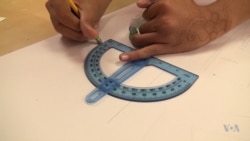Employing a startup style, Khan Lab School brings back one-room concept to teach young students
Silicon Valley, known for its innovative tech companies and startups, also is the birthplace of an experimental school that is disrupting the traditional concept of education.
Twelve-year-old Mishal Junaid loves the unconventional methods of this Khan Lab School.
“When I wake up in the morning I want to wake up, unlike my last school where I want to sleep in and not go to school,” she said.
Junaid and her sister’s response to the school surprises their parents.
“Our children, they love going to school, to the point that even if they are tired or sick or have the flu or whatever, they will not skip school. To the point that we worry why kids come home so happy — are they really learning things?” asked Junaid Qurashi, Mishal’s father.
No homework
Students ages 5 to 15 attend the experimental Khan Lab School. It has no grade levels and no homework. Students of different ages all work together.
“You get to choose what you learn, and it’s not just a teacher hands you a worksheet and tells you to do it. You get to set your own goals; you have a schedule. You go to different classes,” said 9-year-old student Holly Thompson.
The school is the idea of Salman Khan, the founder of Khan Academy — famous for its free online educational videos that have millions of users worldwide. Khan said he started Khan Lab School because he thinks the current education system is flawed, and he hopes to create a better learning model.
“Where I see the future going is somewhat revisiting the past. There’s a lot of really good things about the one room schoolhouse that you might have had in the rural areas that you still have today in a lot of places where you have mixed age classrooms. The advantage there is that older students can take responsibility and mentor younger ones. Younger students get more people. They get the teacher, but also other students being invested in their work,” said Khan.
Personalized learning
Khan said students also learn material at their own pace through videos and more attention from teachers through one-on-one dialogue instead of lectures. And they learn by doing projects.
Malika Junaid noticed a change in her daughters after attending the school. “The biggest difference we saw literally six months into the school was the confidence level in the kids has skyrocketed.
She continued, “I’ve seen the biggest difference in Mishal — talking to elders, talking to others, presenting themselves, doing the eye contact and always wanting to help.”
Khan Lab School Executive Director Dominic Liechti said this way of learning better prepares students for the future.
“We can be innovative and think ahead of kind of what we are heading toward the fourth industrial revolution where a lot of labor force is going to be replaced by robots and we are, at the moment where I see education is actually they are stuck in their classroom. They are stuck in their artifacts. What we’re trying here is really to challenge that,” he observed.
“The role of a teacher needs to change from being kind of a lecturer toward more being like a curator, a tutor but also lifelong learner and an assessor instead of just somebody who just lectures. And on the student side the student is shifting, as well, from a consumer to be more creative.”
Khan is experimenting to see what elements of this private school can apply to public schools, with students from more disadvantaged families.
“That is why we partner with local schools that serve all sorts of demographics," said Khan. "This is I think an imperative for all students that it levels the playing field much more if all of your work is done while you’re at school in that 8:30 to 6 p.m. It puts less of a burden on working parents if their kids are taken care of until 6, and it’s productive time."
Work in progress
Khan said his school is a work in progress.
“Like a R-and-D lab [research and development lab], the first time that you make the drug or the first time that you make the material, it’s not scalable yet, but you need to make it the first time and say 'that’s a pretty strong material' — and then you can think about how do you make it so that it’s more affordable and more scalable,” he said.
Liechti says the community in the Mountain View area has been receptive to this new approach to educating students.
“Especially in Silicon Valley because that’s the culture that you can start something. You can pioneer something, and people join that movement, and I feel that amongst my staff, and I feel that amongst my community, but also I feel that amongst the students."





